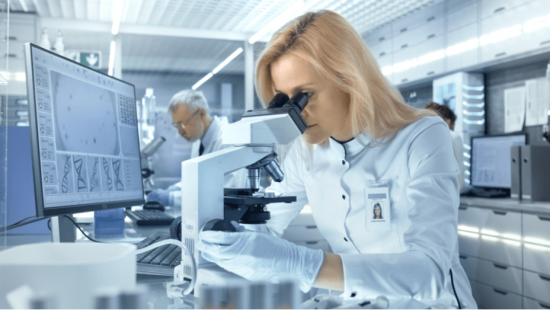Team Tony cultivates, curates and shares Tony Robbins’ stories and core principles, to help others achieve an extraordinary life.
What is precision medicine?
Discover how this exciting field is driving a health revolution
It’s an incredibly exciting time for health and wellness. From the rise of organic food and healthy eating to the popularity of self-care, yoga and meditation, the tide of medical care is shifting from treating symptoms as they arise to preventing them in the first place. At the same time, technological advancements are driving medicine forward at an unprecedented pace. And nowhere are these trends more apparent than in the field of precision medicine.
What is precision medicine?
Precision medicine aims to provide the most efficient and beneficial medical care by optimizing therapies to the individual patient. It uses genetic and molecular profiling to learn about a particular person’s genes, in addition to how their environment, habits and lifestyle choices may affect their health. It uses genomics and genetic testing, data analytics, pharmacology and a patient’s electronic health records to predict, prevent and treat diseases. Precision medicine for cancer is one of the most well-known applications, but it covers everything from heart disease and diabetes to Alzheimer’s disease. The impact of precision medicine is revolutionizing all areas of the healthcare industry.
What is personalized medicine?
Personalized medicine means any type of health treatment that is created for an individual or for members of a certain group. It’s a concept that has been around a long time – for example, matching blood types for transfusions and organ donations, seeing a nutritionist or health coach for a customized diet plan or using chemotherapy that targets specific cells are all examples of personalized medicine. Personalized medicine is the foundation of precision medicine, and there is a lot of overlap between the two.
Difference between precision medicine and personalized medicine
Still wondering, “What is precision medicine? Is it different from personalized medicine?” Many people use the terms interchangeably, and “personalized medicine” is sometimes considered to be an older term for “precision medicine.” But some experts say there is a difference.
While both are customized to an individual’s needs, precision medicine takes it a step further by using a deeper, cellular analysis to classify and treat various disorders. And while personalized medicine is often focused on treating existing conditions, precision medicine can help predict which diseases individuals may be susceptible to so they can make lifestyle changes that help prevent them. Both types of medicine are forging a new, holistic approach to wellness that will change patients’ lives – and save them.
Examples of precision medicine
The easiest way to answer the question “What is precision medicine?” is through some of the field’s impressive accomplishments. Here are some of the most advanced examples of precision medicine
Precision medicine for cancer
Cancer is ultimately a disease of the cells, which makes it a prime opportunity for precision medicine. For example, with genetic profiling, doctors are able to compare the DNA of a tumor with healthy DNA in order to build a more effective treatment plan and predict whether the cancer will return. Genetic profiling also helps doctors administer chemotherapy and radiation alternatives, such as immunotherapy and antibody therapies. Tony Robbins talks about some of the most promising alternatives, as well as preventive precision medicine for cancer, in his book Life Force: How New Breakthroughs in Precision Medicine Can Transform the Quality of Your Life & Those You Love.
Alzheimer’s disease
Alzheimer’s is a complex disease with many subtypes and multiple drivers, including genetics and lifestyle, and it is still poorly understood compared to many other conditions. This makes it a challenging and exciting area for precision medicine with advances being made every day. Researchers are working on building a risk profile to help predict who may get Alzheimer’s. For those who are already diagnosed, advances around neuroimaging technology can track the progression of the disease and improve treatment and various interventions to relieve symptoms. In Life Force, Tony takes readers into the future with a company that’s applying CRISPR gene-editing technology to help decrease anxiety and depression in Alzheimer’s patients.
Pharmacogenomics
Pharmacogenomics is a combination of the words “pharmacology,” or the study of drugs, and “genomics,” the study of genes. It’s a field that studies how a person’s genes affect their response to medication – for example, why some people may respond better to a drug than others, and how to identify the people who will be best served by a particular drug or therapy. It can also help identify those who may experience serious side effects ahead of time, preventing reactions and saving lives. This type of precision medicine is especially effective for cancer treatments as well as psychiatric drugs like antidepressants, which interact with the body and mind in complex ways.
Genetic testing
Genetic testing is another well-known application for precision medicine – and its implications are vast. Genetic testing can detect inherited genes that make a person more likely to develop a disease. Some of the most common genetic tests are for BRCA1 or BRCA2 gene mutations, which can indicate an increased risk of breast cancer in women and other cancers in men. It can also detect hypercholesterolemia, which can lead to heart disease, and Lynch syndrome, which may precede colon cancer. From there, doctors are able to tailor a plan for more effective prevention and treatment.

Benefits of precision medicine
The impact of precision medicine can’t be denied: It can provide more effective and efficient treatments for a variety of diseases and improve patient outcomes. But that isn’t the only benefit. Precision medicine is driving healthcare forward in a variety of ways.
- Shift to a prevention mindset: The American healthcare system tends to focus on treating symptoms, rather than addressing the real underlying causes or better yet, focusing on prevention. When we better understand what causes diseases and can predict them before symptoms even appear, the focus of healthcare will be able to shift to prevention and early intervention – and that’s good for everyone.
- Reduced patient costs: Healthcare is costly. That’s why Tony focuses on an affordable diabetes medication in Life Force. Precision medicine will be able to help by predicting which patients will respond best to certain treatments, optimizing the treatment plan faster and avoiding “trial-and-error” prescribing.
- Advancement of technology: Precision medicine uses some of the most technologically advanced tools available, like CRISPR gene editing, molecular companion diagnostics and use of digital biomarkers. It’s also improved data-sharing in the medical industry, accelerating the integration of electronic health records and advancing the fields of artificial intelligence and machine learning.
So what is precision medicine, really? Many researchers, scientists and observers would say it’s the most exciting thing to happen in the medical field in centuries. If you’re interested in achieving your peak state – physically, mentally and emotionally – precision medicine can change your life.




